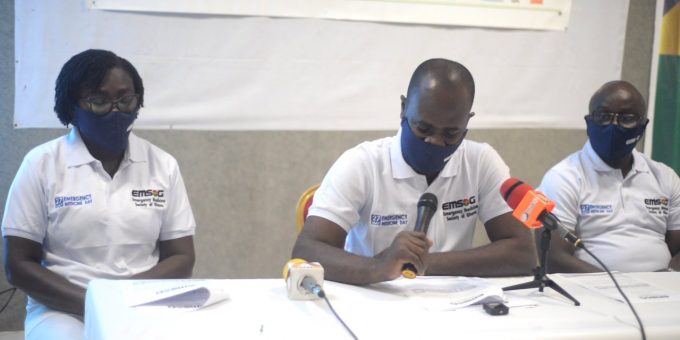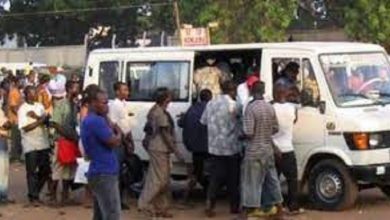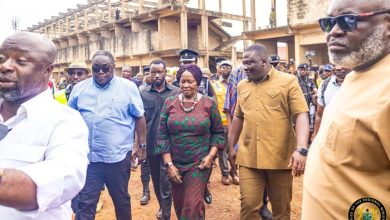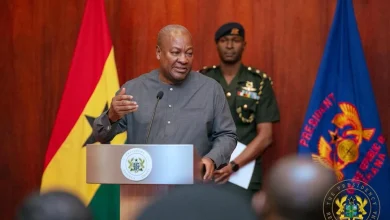
The Emergency Medicine Society of Ghana wants the Ministry of Health to set up emergency medicine units in hospitals nationwide.
Its Acting President, Dr Daniel Osei-Kwame, believes it will reduce preventable deaths and disabilities due to delayed emergency care interventions.
He spoke in Kumasi as World Emergency Day was marked May 26, 2020.
The European Society for Emergency Medicine (EUSEM) instituted Emergency Medicine Day, to be observed every 27th of May.
The local society and its global partners joined hands this year to celebrate its first Emergency Medicine Day under the theme: “A Beacon in the Dark”
Dr. Osei-Kwame is worried inadequate of personal protective equipment at the various health facilities is thwarting efforts to dealing with Covid-19
He hopes government’s measures to curtail the spread of the disease would be backed by science.
“The spread of COVID-19 has significantly exerted its toll on our health system, with reported widespread shortage of Personal Protective Equipment (PPE) and rationing of the same amongst many health care workers. We, therefore, urge the government, through the MOH and its agencies like the GHS, CHAG, etc. to as a matter of urgency procure and supply the necessary PPE for the army of health professionals battling this pandemic on various fronts,” he said.
“We ask the government to continue to let science take preeminence in guiding the nation out of this pandemic. Also, the public should observe cough and sneeze etiquette, wearing masks and social distancing protocols advocated by the Ministry of Health,” Dr. Osei-Kwame emphasized.
The society launched its new website and modalities for membership, sponsorship, and partnership.
“The preventability of many critical injuries and illnesses leading to untimely deaths may be within the reach of the country if efforts are geared towards the building and maintenance of effective and robust emergency systems across the country.
“EMSOG will, therefore, like to urge the Ministry of Health, GHS, CHAG, teaching hospitals and facility managers to prioritize the setting up of emergency medicine departments and units across Ghana to reduce preventable deaths and disabilities resulting from the lack of timely emergency care interventions,” Dr. Osei-Kwame said.
Emergency medicine encompasses both pre-hospital and hospital care of the acutely injured or ill person.
It involves provision of urgent as well as emergent care to patients.
The introduction of the International Emergency Medicine Day into the world calendar seeks to highlight the efforts of gallant emergency care workforce renders to patients in distress.
They are mostly the first line of contact and regularly provide the first ray of hope to patients, many of whom would otherwise give up.
It is in recognition of the need for awareness of and establishment of a developed, structured and well -organized emergency medical systems worldwide.
Read full statement below
EMERGENCY MEDICINE DAY
Theme: A beacon in the dark
Emergency medicine is a branch of medicine that encompasses both prehospital and hospital care of the acutely injured or ill patient. This involves the provision of urgent as well as emergent care to patients through a formalized, systematic, and coordinated approach interplayed amongst prehospital and hospital emergency staff.
The International emergency medicine day being introduced to the world seeks to highlight the efforts the gallant emergency care workforce renders to a vast majority of patients in distress. They are mostly the first line of contact with the patient in distress and regularly provide the first ray of hope to these patients, many of whom would have given up on their health.
In recognition of the need for awareness of and establishment of a developed, structured and well -organized emergency medical systems worldwide, the European Society for Emergency Medicine (EUSEM) instituted Emergency medicine day, on the 27th of May. This year, EMSOG is proud to partner with EUSEM to celebrate its first emergency medicine day under the theme: “A beacon in the dark” with the launch of our new website and modalities for membership, sponsorship, and partnership.
CURRENT STATE OF EM CARE
Until recently, most emergency care centers, where available, were staffed by medical officers with no formal training in Emergency Medicine. In 2009, an Emergency Medicine training program was established in Komfo Anokye Teaching Hospital in Kumasi through the collaborative efforts of the hospital, Kwame Nkrumah University of Science and Technology School of Medical Sciences, and the University of Michigan, USA. So far, forty three (43) emergency physicians and about three hundred (300) emergency nurses have been trained. The Paramedic and Emergency Care Training school in Nkenkaasu has also contributed two thousand one hundred and seventy-five (2,175) emergency medicine technicians with others still in training. Though these numbers are laudable, they are inadequate as most emergency centers in the country remain poorly resourced and understaffed. Furthermore, many regions lack the full complement of these professionals, much more the logistics required to enable them to function effectively.
Thankfully the National ambulance service (NAS) has gradually seen positive growth since its inception in 2004, with the latest being the injection of 307 new ground ambulances to its pool. This has enabled NAS to migrate from Seven (7) Stations in Three (3) Regions to 130 stations maintaining its presence in every Region in Ghana and boasting of ten control rooms.
EMSOG
The emergence of emergency medicine in Ghana, though relatively young and still in its budding stages in many parts of the country has chalked a lot of successes. Prominent amongst them is the official coming together of all the cohorts of emergency health care workers under one umbrella: Emergency Medicine Society of Ghana, EMSOG, to pursue the agenda of quality emergency medicine practice and emergency care services throughout the nation as well as shape and advance emergency care through research and evidence-based practices. EMSOG is a member of the African Federation of Emergency medicine (AFEM), and the International Federation of Emergency medicine (IFEM).
THE WAY FORWARD-Clinical care
Accessibility of quality emergency care services is integral in Ghana’s efforts at achieving universal health coverage by the year 2030. Hospitals in the country have been mandated by the government to set up and operationalize functional Emergency medicine units to help promote and augment efforts by the government toward the realization of Universal health coverage. This current state however, begs the question; will Ghana have well-equipped and well-trained emergency professionals manning its emergency delivery systems a decade from now? As much as we recognize the efforts being made especially concerning the prehospital front, with the recent acquisition of the 307 state-of-the-art ground ambulances, more needs to be done especially with the training and equipping of the various cadres of emergency care providers in-hospital and the provision of a well-resourced working environment.
Whilst the reduction in mortality and morbidity for patients presenting with emergencies is evident in places and facilities with established emergency medicine practice in Ghana, the same cannot be said for many facilities with no system in place for taking care of the acutely ill, injured or the undifferentiated patient. The preventability of many critical injuries and illnesses leading to untimely deaths may be within the reach of the country if efforts are geared towards the building and maintenance of effective and robust emergency systems across the country. EMSOG will, therefore, like to urge the Ministry of Health, GHS, CHAG, Teaching hospitals and facility managers to prioritize the setting up of emergency medicine departments and units across Ghana to reduce preventable deaths and disabilities resulting from the lack of timely emergency care interventions.
THE WAY FORWARD- TRAINING
The training of specialized health care professionals who can manage acute injuries and illness may be the frontline beacon of hope that the country has been yearning for. It is because of this that we call on
the government and other affiliate academic bodies to help in capacity building and training of the emergency workforce through various means such as developing and implementing the numerous widely acceptable sub-specialty programs for the various cadres of health professionals in emergency medicine. We also encourage the decentralization of emergency medicine training across the country. This will help bridge and to a large extent address the shortfall of emergency medicine workforce needed by the country.
COVID AND EM
As we commemorate this day, let’s not forget the ravaging effect of the COVID-19 pandemic globally. The spread of COVID-19 has significantly exerted its toll on our health system with reported widespread shortages of Personal Protective Equipment (PPE) and rationing of the same amongst many health care workers. We, therefore, urge the government through the MOH and its agencies like the GHS, CHAG, etc. to as a matter of urgency procure and supply the necessary PPE’s for the army of health professionals battling this pandemic on various fronts. We ask the government to continue to let science take preeminence in guiding the nation out of this pandemic. Also, the public should observe cough and sneeze etiquette, wearing masks and social distancing protocols advocated by the Ministry of Health.
SOLIDARITY TO FRONTLINE WORKERS
To all health workers, especially the frontline workforce, we salute your resolve to continue to provide health care in these austere moments, selflessly offering your services to the country. We entreat frontline workers to maintain efficient team dynamics in their approach to the care of the patients and to regularly update themselves on the evolving literature and best practices for COVID-19 using any readily accessible authentic resources. We recognize the many challenges within and without the medical fraternity that you have to overcome daily to create a conducive environment for work.
We appreciate the physical as well as emotional stress that you go through in the fight against this invisible enemy. We encourage each one of you at the forefront to stand firm and make mother Ghana proud.
The confidence people repose in our medical system is viewed mostly through the lens of the emergency care they receive. There may not be widespread emergency coverage in Ghana, but the story is not all gloomy. Many emergency units of various hospitals are holding their own in the face of this pandemic and its many challenges. Emergency medicine will however continue to be a beacon of hope to Ghana’s health system.
Together we shall overcome. In this period of COVID 19 pandemic, I call on all emergency medicine professionals to be beacons in this period of darkness.
Long live EMSOG!!
Long live Ghana!!!
Dr. Daniel Osei- Kwame
Interim President, Emergency Medicine Society of Ghana
Lead Clinician, Emergency Medicine Directorate, Komfo Anokye Teaching Hospital
Source: Ghana/otecdfmghana.com




